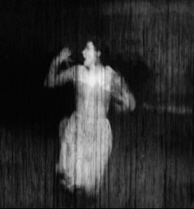Lost METROPOLIS Scenes Found In Argentina!
Thanks to a sensational discovery in Buenos Aires, the German silent classic Metropolis finally will be restored to its full, original length.
The Friedrich-Wilhelm-Murnau Foundation, dedicated for the past 42 years to German film preservation, reported last week that long-lost portions of Fritz Lang's groundbreaking silent Sci Fi movie Metropolis have been discovered in Buenos Aires, Argentina.
The rediscovery, revealed by the newspaper Die Zeit, came to light after Paula Felix-Didier, curator of Buenos Aires' Museo del Cine Pablo C. Ducros Hicken, acted on a tip-off from a former film club director that three reels (25 minutes' worth) of missing scenes had been gathering dust in a 16mm negative in the museum's archive since the early 90s. Fearing that the discovery would not be taken seriously in Argentina, she compiled a DVD and flew last month to the Wiesbaden, Germany, headquarters of the Murnau Foundation, which holds the rights to Metropolis. She presented it to three experts, who confirmed that the extra scenes were from the original film, but that approximately five minutes of footage probably still was missing.
 Helmut Possman, director of the Murnau Foundation, said the experts had no doubts about the authenticity of the reels. "We're not being fooled. The film can now be shown more or less as Lang originally intended it. In terms of understanding what it's about, we'll be seeing a new film."
Helmut Possman, director of the Murnau Foundation, said the experts had no doubts about the authenticity of the reels. "We're not being fooled. The film can now be shown more or less as Lang originally intended it. In terms of understanding what it's about, we'll be seeing a new film."
Set in a dystopian future city-state, Metropolis was at the time one of the most expensive films yet produced, which was director Lang's ambition. According to some estimates, it still ranks as one of the most expensive movies ever made once inflation is factored in. But it was hated by critics and the public alike when the original version was shown in Berlin in May 1927, and this commercial failure nearly ruined the studio behind the film. The 210-minute version was shortened by Paramount Pictures, leading to an oversimplification of the plot, the disappearance of key scenes and the sidelining of significant characters. The longest running time the public has seen on any version since is 118 minutes.
However, much like Orson Welles' Citizen Kane, critical and fan regard for Metropolis steadily rose over time, and it became the first film entered into UNESCO's Memory of the World Register, which aims to preserve cultural achievements of outstanding significance.
 A copy of the longer version of the film was first sent to Buenos Aires in 1928 at the request of Adolfo Z. Wilson, head of the Terra film distribution company, who hoped to show it in Argentine cinemas. Film critic Manuel Pena Rodriquez obtained the reels shortly afterwards.
A copy of the longer version of the film was first sent to Buenos Aires in 1928 at the request of Adolfo Z. Wilson, head of the Terra film distribution company, who hoped to show it in Argentine cinemas. Film critic Manuel Pena Rodriquez obtained the reels shortly afterwards.
The story of the Metropolis restoration project is well-known. It began in the 1960s in the national film archive of the German Democratic Republic, with critical reconstruction being performed by the Film museum Munich in the 80s, and the film was digitally restored by veteran archivist Martin Köerber in 2001. Plus, film historian Enno Patalas developed a study version in the 80s that supplemented the surviving footage with text, stills and music.
Manuel Pena Rodriguez sold the missing reels in the 60s to Argentina's National Art Fund. A copy of them was passed onto the Museo del Cine in 1992, but their value was not fully realized until now.
The restored version, which has so far been seen by only a handful of film experts and critics in Berlin, is said to throw light on key questions that have puzzled and tantalized generations of film buffs.
Director Possman promised the movie would be made available to the public after it has been restored. But he said that, due to the poor condition of the film stock, it's too early to say how long restoration will take. "It's taken several years with similar films."
"It doesn't matter how bad the condition of the material is," Martin Köerber expressed to Die Zeit, "the original intention of the film, including all of its minor characters and subplots, is now once again tangible for viewers. The rhythm of the film has been restored."
"I can't wait to see this...I really can't," gushed Ain't It Cool News reporter MERRICK, who posted stills of some found footage. "I always figured a day like this might come around, but after a lifetime of waiting...it's easy to second guess one's self."
[Thanks to KATE CONNOLLY at Guardian.co.uk. Also thanks to Reuters, Newsroom America.com and Zeit Online.]